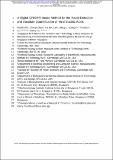| dc.contributor.author | Wu, Xiaolin | |
| dc.contributor.author | Tay, Joshua K | |
| dc.contributor.author | Goh, Chuan Keng | |
| dc.contributor.author | Chan, Cheryl | |
| dc.contributor.author | Lee, Yie Hou | |
| dc.contributor.author | Springs, Stacy L | |
| dc.contributor.author | Wang, De Yun | |
| dc.contributor.author | Loh, Kwok Seng | |
| dc.contributor.author | Lu, Timothy K | |
| dc.contributor.author | Yu, Hanry | |
| dc.date.accessioned | 2022-07-15T14:27:40Z | |
| dc.date.available | 2022-07-15T14:27:40Z | |
| dc.date.issued | 2021 | |
| dc.identifier.uri | https://hdl.handle.net/1721.1/143762 | |
| dc.description.abstract | Rapid diagnostics of adventitious agents in biopharmaceutical/cell manufacturing release testing and the fight against viral infection have become critical. Quantitative real-time PCR and CRISPR-based methods rapidly detect DNA/RNA in 1 h but suffer from inter-site variability. Absolute quantification of DNA/RNA by methods such as digital PCR reduce this variability but are currently too slow for wider application. Here, we report a RApid DIgital Crispr Approach (RADICA) for absolute quantification of nucleic acids in 40-60 min. Using SARS-CoV-2 as a proof-of-concept target, RADICA allows for absolute quantification with a linear dynamic range of 0.6-2027 copies/μL (R2 value > 0.99), high accuracy and low variability, no cross-reactivity to similar targets, and high tolerance to human background DNA. RADICA's versatility is validated against other targets such as Epstein-Barr virus (EBV) from human B cells and patients' serum. RADICA can accurately detect and absolutely quantify EBV DNA with similar dynamic range of 0.5-2100 copies/μL (R2 value > 0.98) in 1 h without thermal cycling, providing a 4-fold faster alternative to digital PCR-based detection. RADICA therefore enables rapid and sensitive absolute quantification of nucleic acids which can be widely applied across clinical, research, and biomanufacturing areas. | en_US |
| dc.language.iso | en | |
| dc.publisher | Elsevier BV | en_US |
| dc.relation.isversionof | 10.1016/J.BIOMATERIALS.2021.120876 | en_US |
| dc.rights | Creative Commons Attribution-NonCommercial-NoDerivs License | en_US |
| dc.rights.uri | http://creativecommons.org/licenses/by-nc-nd/4.0/ | en_US |
| dc.source | medRxiv | en_US |
| dc.title | Digital CRISPR-based method for the rapid detection and absolute quantification of nucleic acids | en_US |
| dc.type | Article | en_US |
| dc.identifier.citation | Wu, Xiaolin, Tay, Joshua K, Goh, Chuan Keng, Chan, Cheryl, Lee, Yie Hou et al. 2021. "Digital CRISPR-based method for the rapid detection and absolute quantification of nucleic acids." Biomaterials, 274. | |
| dc.contributor.department | Singapore-MIT Alliance in Research and Technology (SMART) | |
| dc.contributor.department | Massachusetts Institute of Technology. Center for Biomedical Innovation | |
| dc.contributor.department | Massachusetts Institute of Technology. Synthetic Biology Center | |
| dc.contributor.department | Massachusetts Institute of Technology. Research Laboratory of Electronics | |
| dc.contributor.department | Massachusetts Institute of Technology. Department of Electrical Engineering and Computer Science | |
| dc.contributor.department | Harvard University--MIT Division of Health Sciences and Technology | |
| dc.contributor.department | Massachusetts Institute of Technology. Department of Biological Engineering | |
| dc.relation.journal | Biomaterials | en_US |
| dc.eprint.version | Original manuscript | en_US |
| dc.type.uri | http://purl.org/eprint/type/JournalArticle | en_US |
| eprint.status | http://purl.org/eprint/status/NonPeerReviewed | en_US |
| dc.date.updated | 2022-07-15T14:19:37Z | |
| dspace.orderedauthors | Wu, X; Tay, JK; Goh, CK; Chan, C; Lee, YH; Springs, SL; Wang, DY; Loh, KS; Lu, TK; Yu, H | en_US |
| dspace.date.submission | 2022-07-15T14:19:39Z | |
| mit.journal.volume | 274 | en_US |
| mit.license | PUBLISHER_CC | |
| mit.metadata.status | Authority Work and Publication Information Needed | en_US |
